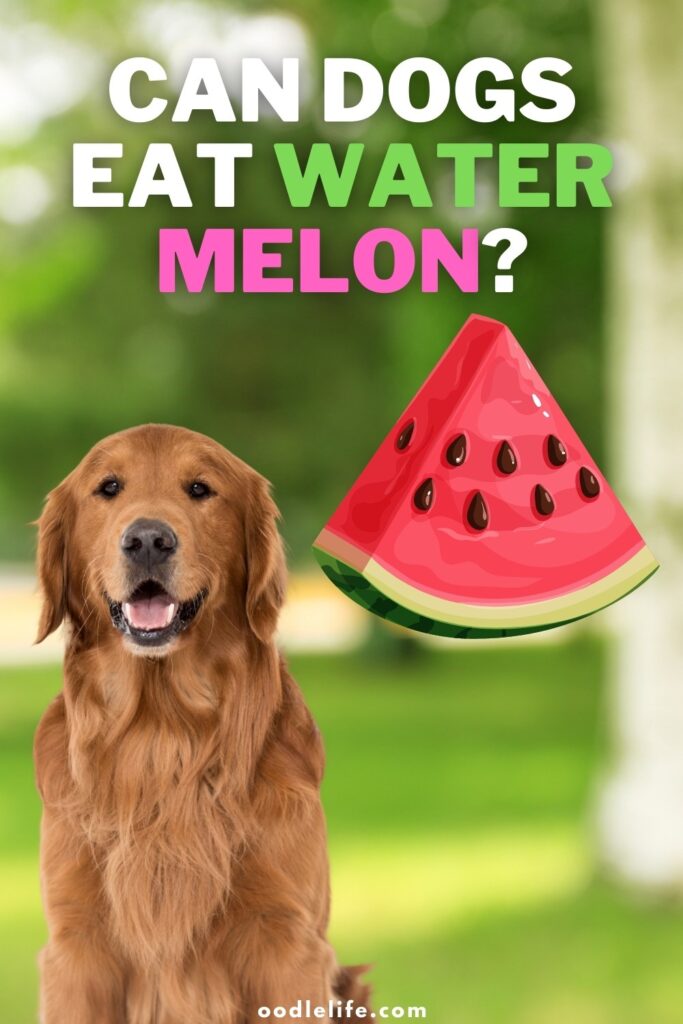Can Dogs Eat Watermelon? [SAFETY Concern?]
Watermelon is a delicious treat, and for many, it’s an enjoyable summertime refresher for the whole family. Like many fruits, it’s full of vitamins, fiber, and antioxidants that are essential parts of a nutritionally complete diet… for humans.
But can dogs eat watermelon? Can you give a puppy watermelon?
Cutting into and sharing watermelon is a widespread summer tradition for so many families. Many have wondered whether it’s a good idea to include our canine family members in the activity. Here’s what you need to know about whether dogs can eat watermelon.
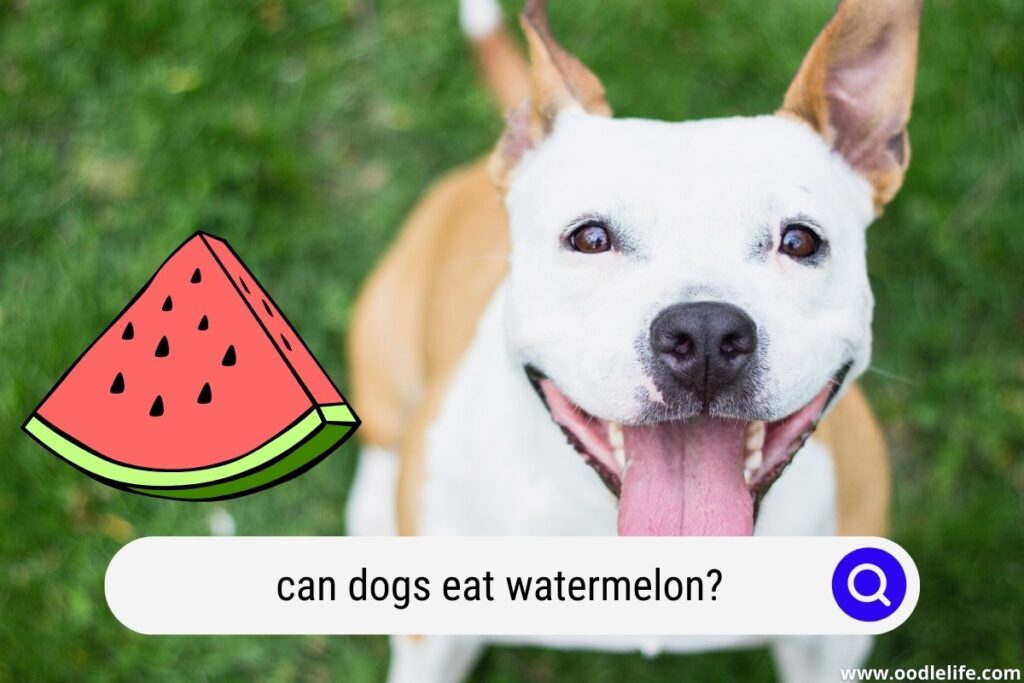
What Should I Consider When Feeding My Dog Watermelon?
When the dog is around while the family cuts into a melon, it’s tempting to share some as a bonding exercise. The good news is, in most cases, this can be done safely and even can be a healthy addition to your pup’s diet!
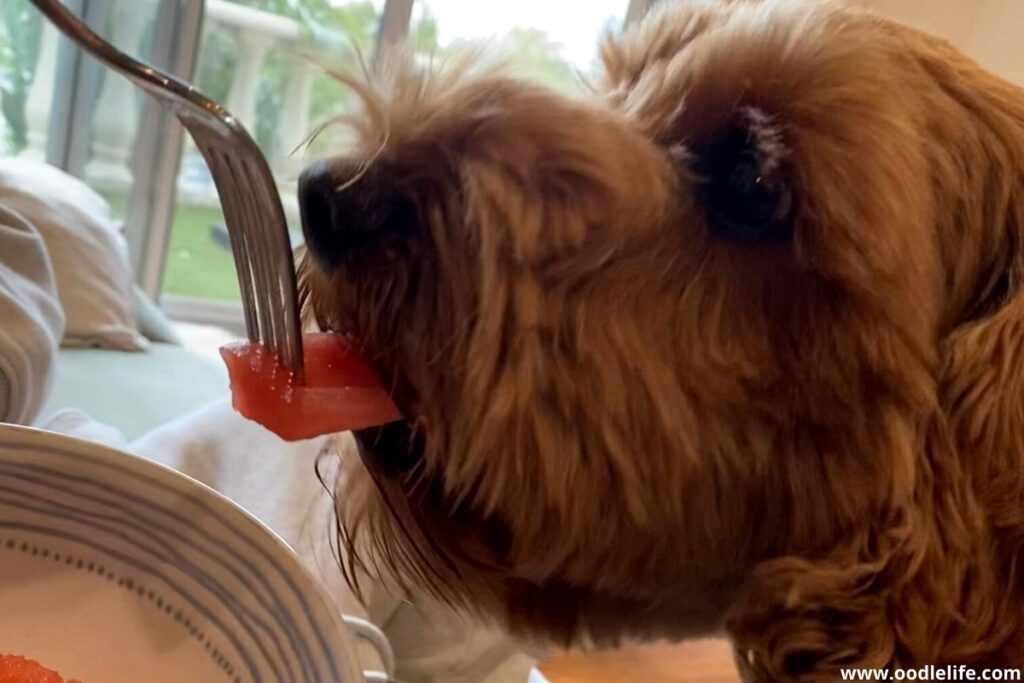
What Risks Are There When a Dog Eats Watermelon?
Watermelon, like lots of fruits, is made up of a mix of tissues.
Sure most of a water melon is water and vitamins (like Vitamin C and Vitamin A). So hardly going to cause a terrible trouble for your dog. However, you need to think about more than just the healthy fruit interior.
Some of these tissues are much tougher and harder to digest than others. Specifically, the rind and green edges of watermelon slices contain more fiber packed into a smaller area than the softer red tissue inside.
Smaller dogs are at a higher risk of gastrointestinal problems, which can be caused by consuming the tougher regions of the fruit. This is because these pieces are harder to break down in the digestive tract and may cause several concerning symptoms like abdominal pain, lethargy, vomiting, and constipation.
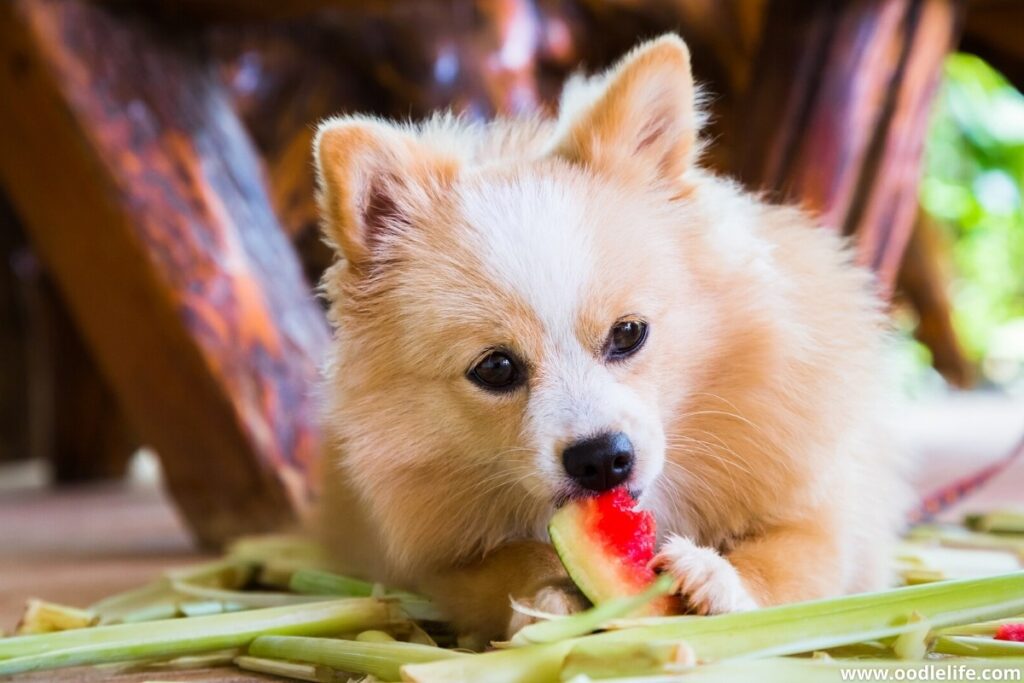
The good news is that these tougher parts of the fruit are also the less sweet parts of the fruit, which may discourage your dog from eating them anyway.
However, it’s best to simply cut watermelon into safe pieces of soft red tissue before giving it to your dog.
- These pieces should be bite-sized and free of tougher regions
- The green and white portions can cause gastrointestinal problems.
- Chunky less digestible parts of the fruit could in theory cause intestinal blockage or just gastrointestinal upset
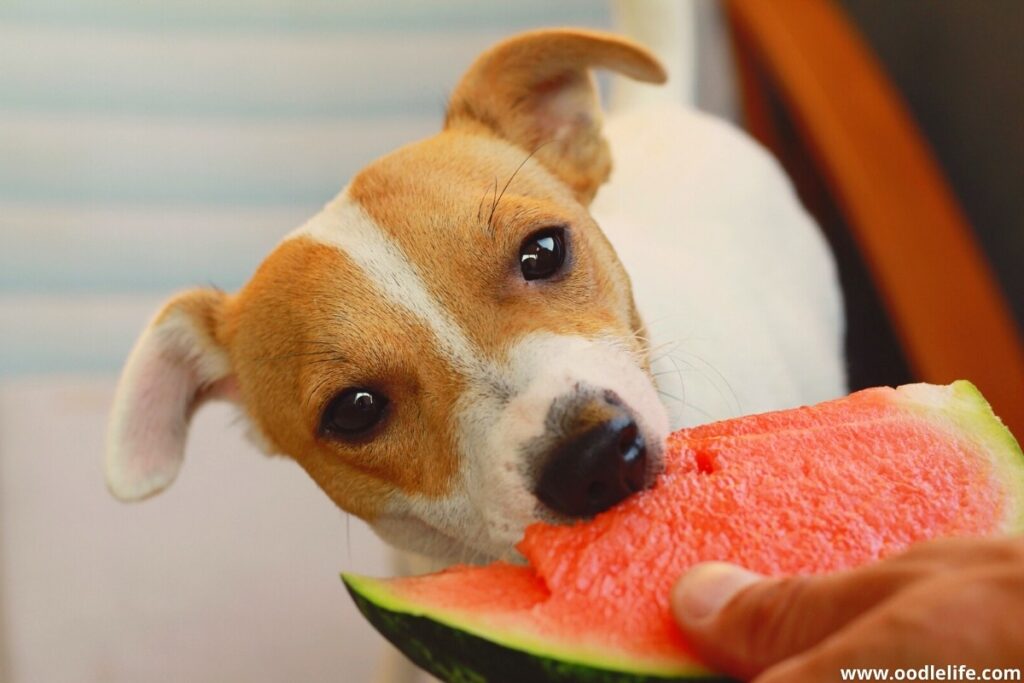
Another potential risk that is much higher in smaller dogs is the presence of watermelon seeds in the fruit.
In general, the distribution of watermelon seeds in the fruit is mostly harmless, with not enough seeds packed in a small enough area to cause problems. However, seeds can accumulate in your dog’s gastrointestinal tract.
If the seeds accumulate and cannot mechanically pass through your dog, this can cause the same gastrointestinal symptoms caused by a blockage of tough rind tissue. In general, it’s a good idea to ensure that any risk of disrupting digestion is reduced as much as possible.
It’s a good idea for a dog owner to monitor your dog for symptoms of interrupted digestion for 24 hours after your dog consumes watermelon rind or seeds.
What Nutritional Information Should I Know About Watermelon for Dogs?
Is watermelon for dogs.. healthy?

First of all, it’s crucial to distinguish fresh watermelon (or unsweetened watermelon which has been frozen) from anything packed, canned, jarred, or stored in syrup. These products may have started out as watermelon, but the sugar content of treats like these make them ill-suited for any dog’s diet.
That being said, some of the same health benefits that humans derive from fresh watermelon are also available to dogs when fresh watermelon is eaten in moderation.
Vitamins A, B1, B5, B6, and C are all found in high concentrations in the fruit, which is actually 92% water — it’s a fantastic and vitamin-rich way to stay hydrated! This water is also rich in natural minerals like potassium and magnesium.
Watermelon is also high in some antioxidants like beta-carotene, which are known to reduce the risk of developing cancer. Furthermore, the fiber content of watermelon can be a helpful addition if fiber is lacking in other areas of your dog’s diet.
Will My Dog Like Watermelon?
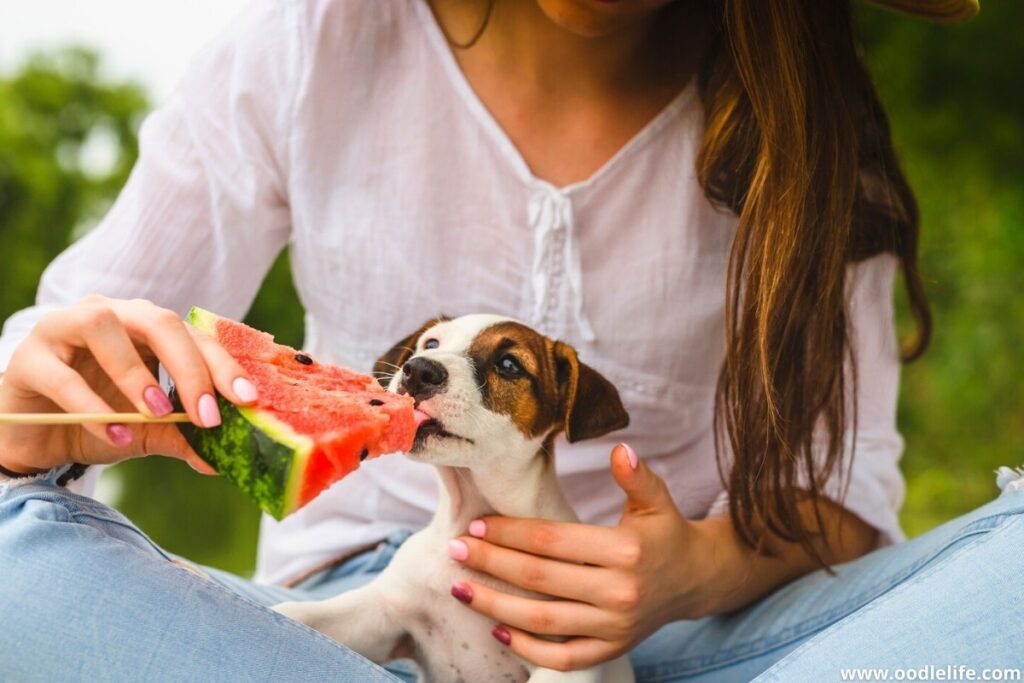
Everyone knows dogs love to be included, especially when the family is spending time together over a shared activity. If you’re tempted to introduce your dog to watermelon, incorporating it into a family activity can be a great way to turn it into a bonding experience. It doesn’t hurt that it tastes great!
The sweetness can be off-putting for an unsuspecting pooch, but as long as your dog is given a moment to examine it ahead of tasting it, there should be no surprises — dogs are, after all, known for their keen sense of smell.
The main reason why such a sweet food could be problematic is simply that dogs don’t often eat food as sweet as watermelon, but there’s good news. The sugar content of fresh watermelon is packaged away in a scaffolding of fiber that prevents it from leading to a potentially harmful insulin spike.
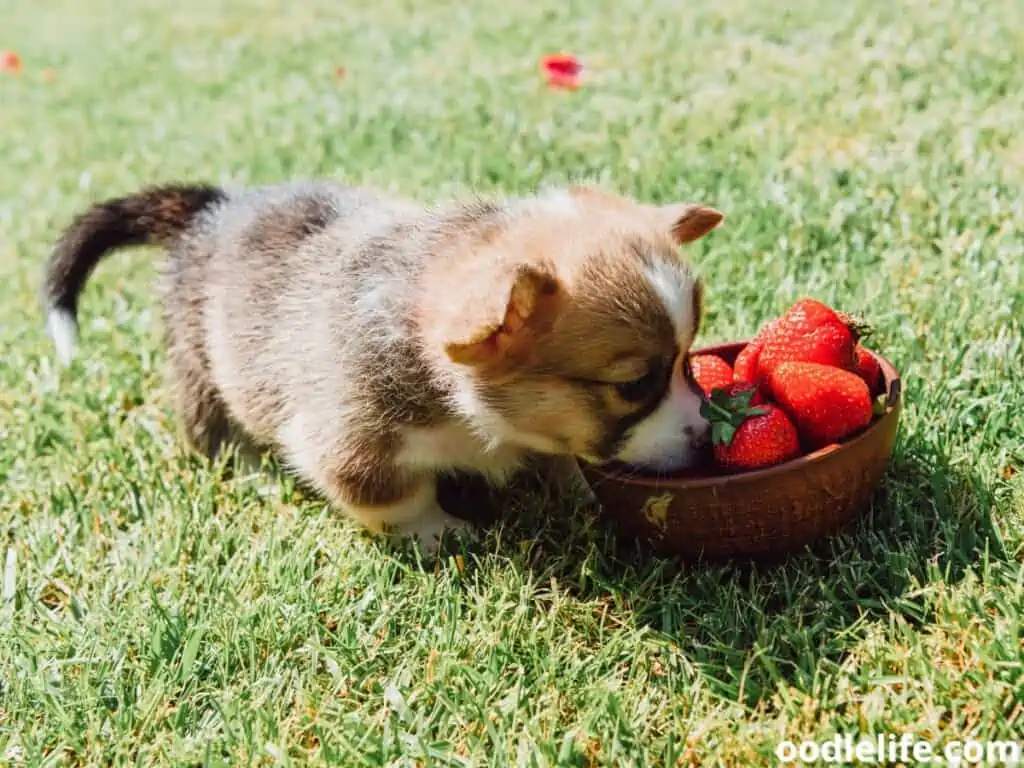
As in any situation when introducing new food to your dog, veterinarian Erin Katribe suggests easing into it, offering small pieces at first, and gradually responding to your dog’s level of enthusiasm and apparent level of physical comfort. It’s possible that a soft stool could indicate that a trial run with watermelon might have been too much too soon.
Watermelon is a refreshing sweet treat, and many attest to the rewards of freezing it to be enjoyed on a hot day as a way to cool off. As long as you slowly introduce your dog to the fruit and make sure your dog isn’t eating any rind tissue or seeds, it can be a perfectly safe and rewarding experience to provide your dog.

When In Doubt, Speak to the Vet
Of course, extenuating medical circumstances can make any specific food a unique hazard, so it’s a good idea to consult a vet before going forward with feeding human food to any pets.
However, watermelon is a mostly innocuous food item, especially when it’s carefully prepared ahead of time.
There are only a few minor risks to feeding your dog watermelon. It is unlikely to damage your dogs teeth or cause a health problem.
When cautionary measures are put in place ahead of time, these risks can easily be offset by the nutritional and social rewards of sharing watermelon.
- Can dogs eat cilantro?
- Can dogs drink lemon water?
- Can dogs eat graham crackers?
- How to cook chicken for a dog
- Can dogs eat pepperoni?
- Can dogs eat potato skins? (What is potato poisoning)
